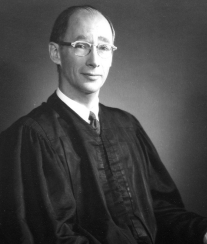The Honorable Edmund B. Spaeth, Jr., was born in Washington, D.C. on June 10, 1920. He graduated magna cum laude and Phi Beta Kappa from Harvard College, then served in the U.S. Navy during World War II. After his service, he earned his law degree from Harvard Law School. President Judge Spaeth went on to work in private practice at Philadelphia’s MacCoy, Evans, & Lewis law firm.
President Judge Spaeth was appointed to the Philadelphia County Court of Common Pleas in 1964 and was later elected to a ten-year term. His most notable case on this court was Jackson v. Hendricks, where a three-judge panel suspended Holmesburg Prison’s operations until they reformed their inhumane practices.
President Judge Spaeth was appointed to the Superior Court in 1973, then after losing a general election for a full term, he was appointed again in 1974. President Judge Spaeth won his election to a full term a year later. During his tenure, President Judge Spaeth served as chairman of the Philadelphia Commission for Effective Criminal Justice. On August 11, 1983, he became the thirteenth president judge of the Superior Court, and the first in this position from Philadelphia County. Two years later, President Judge Spaeth left the court and returned to private practice. He joined the law firm of Pepper Hamilton until his retirement in 2002.
The same year as his first appointment to the Superior Court, President Judge Spaeth became a lecturer at the University of Pennsylvania Law School. He taught both evidence and professional responsibility classes and became a senior fellow at the law school after 12 years. Additionally, President Judge Spaeth cofounded and directed the Law School’s Center for Professionalism. Before he stepped down from the position in 1997, he received the Harvey Levin Award for Excellence in teaching.
President Judge Spaeth, a lifelong advocate for judicial reform, was appointed by the Governor of Pennsylvania in 1989 to recommend changes to the Pennsylvania judicial system; his recommendations included forming a judicial discipline board and court with separate prosecutorial and judicial functions. His recommendations later became amendments to the Pennsylvania Constitution. President Judge Spaeth, after a long and impressive career in law, passed away in 2016 at 95 years of age.

